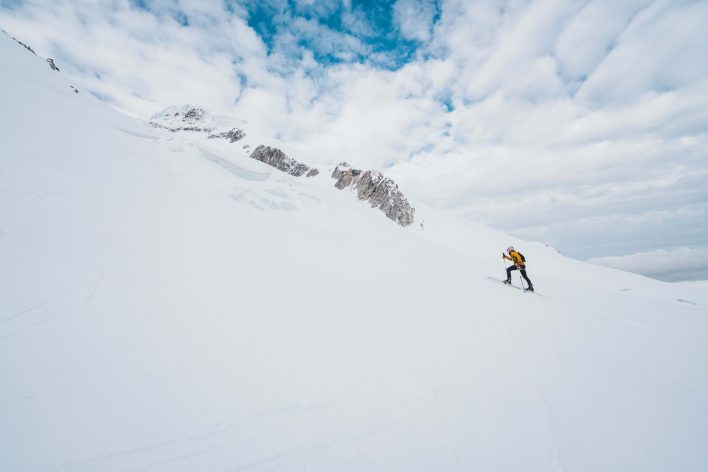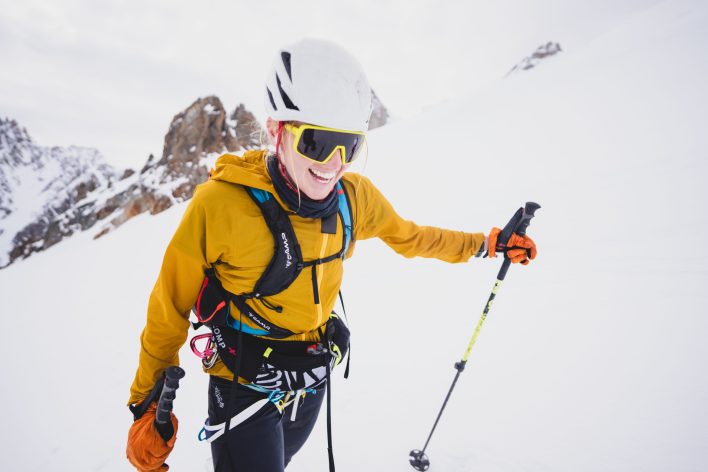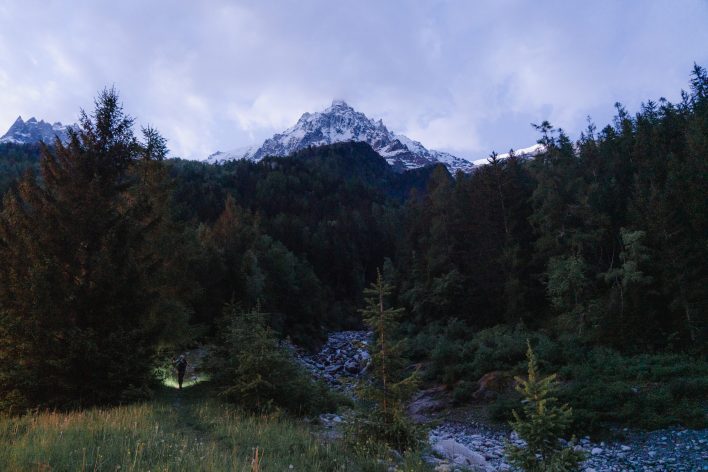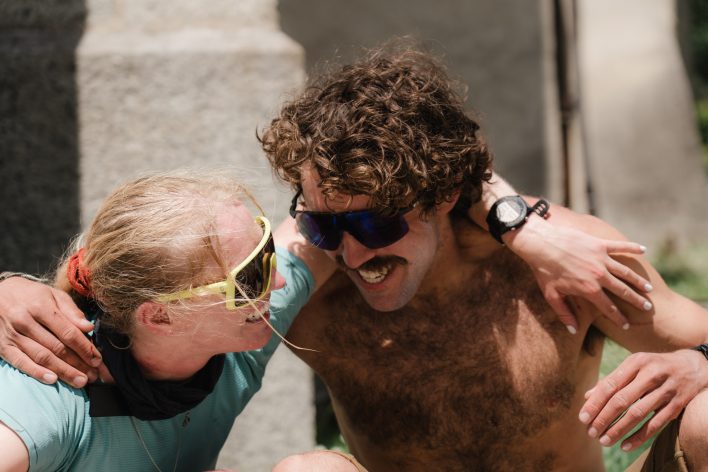When Anna DeMonte arrived in Paris, France, for a work trip in February, she intended to use the opportunity to ski classic steeps in Chamonix before returning to her home in Utah. Four months and one Fastest Known Time later, she now hopes to inspire others.

On June 5th, 2024, Anna DeMonte set the women’s ski Fastest Known Time (FKT) on Mont Blanc in Chamonix, France, in 7 hours and 29 minutes. She completed the roundtrip solo and self-supported, carrying all of her gear the entire time.
First climbed in 1786, Mont Blanc’s massive, overhanging seracs and shifting glaciers make it a challenging, sometimes dangerous test piece. Its prominence—at 15,774 feet Mont Blanc is the highest mountain in the Alps—and proximity to the town of Chamonix have enticed many climbers, skiers and runners alike.
That said, DeMonte is the first woman to attempt a ski FKT on Mont Blanc. It’s a fact that initially gave her pause. Runner Hillary Geraldi set an overall FKT of 7 hours and 27 minutes on Mont Blanc (according to fastestknowntime.com), but on a supported run, as opposed to skis.
“Originally, I was deterred from the objective because there were no women that had skied it in the past,” she says. “I actually thought to myself it’s going to be the only known time. Who cares about that?”
But DeMonte turned the lack of a known record into motivation instead. She hopes by setting a time, others won’t be disheartened in the way she was.
“It’s almost discouraged for a woman to be competitive. It’s not cool to want to win. I think there’s also space for competition and for that to be healthy and encouraged among women. I think that’s important,” says DeMonte.
Her speed attempt on the storied peak was a culmination of four months of preparation in Chamonix. Since February, DeMonte had lived out of a van, working her remote tech job via a Starlink connection while training for the route. But she says the preparation started well before she arrived in France.

“[I had to] put together a lot of the skills I had been working on in Utah and in the U.S. over the last few years, like ice climbing and crevasse travel, and obviously, the aerobic side of things,” she explained. “And of course, the skiing. I started skiing, and I was terrible.”
DeMonte only started skiing in 2020. The whole mountain sports endeavor is still relatively new to her. Hailing from Ann Arbor, Michigan, DeMonte spent her early years pursuing swimming. She qualified for the Olympic Trials in 2012 and competed for the University of Tennessee in college.
Despite her obvious talent, the competitive swimming scene took a toll, and DeMonte eventually burned out. She took her aerobic skills to cycling but was halted again, this time by a spinal injury that took her off her feet for six months. She moved to Utah to refresh and picked up climbing, skiing and trail running after discovering a love for the mountains.
Fast forward seven years, and DeMonte found herself gunning for an individual speed attempt on the technical granite and glaciers of Mont Blanc. But an FKT wasn’t the initial plan . When she first showed up in Chamonix, DeMonte had her eyes set on steep lines off the Aiguille du Midi—a 12,605-foot peak accessible by cable car and famous for a plethora of world-renowned ski lines.
DeMonte’s partner, Jack Kuenzle, was training for the Mont Blanc FKT from the start. Once DeMonte found herself living below the Mont Blanc massif, she was inspired by Kuenzle’s dedication to a singular goal, as well as the peak itself.
“I think sometimes we like to protect our own egos by saying, oh, I’m not trying to go fast,” reflects DeMonte. “It’s a little bit vulnerable to say you’re going to try. Because if you fail, people know about it. So I think it’s cool to put yourself out there and go for something.”
Once DeMonte set her mind on an FKT of her own, the pair devoted their time to training together in the surrounding mountains. DeMonte says the process of training and connecting with people to learn the route is what made the speed record worth it.

“Even sitting here now, months later, it was the process of training for it, trying to get fit enough, learn the mountain well enough to understand where things were risky, I love that,” says Demonte. “That was what I remember more than the actual day.”
That’s not to say she won’t remember the day of her FKT, though. The classic speed record route is church to church, starting and ending at the Eglise de St. Michel in the center of Chamonix.
“Leaving the church was super fun,” DeMonte says. “You have all this adrenaline, and you’re running through the town where there’s nobody in the early morning, and have skis on your back, which seems bizarre, because it’s summertime in the valley.”
On snow, the ascent got harder. Refrozen overnight and with the sun barely visible behind a thick layer of clouds, the skinning was treacherously icy.
At one point, she lost an edge on a traverse, sliding haphazardly 60 feet and losing a pole in the process. It was a challenging mental battle for DeMonte, but she pushed on.
“That frustration lasted quite a while,” DeMonte recollects. “But eventually, the sun came out on the ridge and it was beautiful. I actually thought to myself, a few years ago I was lying flat on my back, and I could barely walk. Now I’m on this mountain, and I’m about to be on the summit and honestly I just felt grateful to be there.”
When she reflects on the experience it’s moments like those that stand out. Not the time she set on the day.
“The amount of effort that Jack and I put in training together, our partnership in the mountains, I think, is the most special thing that came out of it all,” she says.

The community as a whole, too, is a highlight.
“We had gone to the local ski shop and a bunch of the guys from the shop were there when I finished and I was so flattered,” she says. I can hear smiling through the phone, even though I can’t see it. “The people that worked at the Grand Mulets Hut on the route, we had gone to that hut a few times, and they were cheering. So much goes into putting together a day like that and it’s moments like those that are the things that I probably remember the most.”
When asked about her future, it’s a mix of a newfound aspiration to search out FKTs while continuing to enjoy what she loves about mountain sports: quality time with a shared community. Mont Blanc is still squarely on her mind though. DeMonte’s confident she could have gone faster.
“Now there’s a ski time, and I honestly hope someone goes out there and crushes it,” DeMonte says. “Because to me, that will advance women in the sport. And then I’ll try to go beat it.”
To read more from the untracked experience or to see our stories when they’re first published in print, subscribe.










this article is very useful, thank you for making a good article
nice information and good article thank you